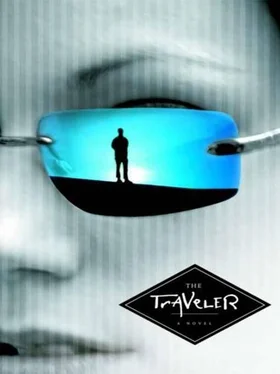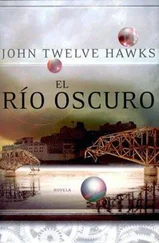Halfway to the bottom of this green bowl, he saw a small black shadow about the size and shape of a ship’s porthole. The shadow was something independent from the whirlpool. It vanished beneath the spray and foam, like a dark rock hidden in a river, only to reappear again in the same position.
Kicking and thrusting with his hands, Michael fell downward toward the shadow. Lost it. Found it again. And then he threw himself into its dark core.
Most of the glass-enclosed gallery that ran around the interior of the Tomb was used by the technical staff, but the north side of the building could be entered only through a guarded door. This private viewing area was carpeted and filled with a sectional couch and stainless-steel floor lamps. Small black tables and straight-backed suede chairs were set beside the tinted windows.
Kennard Nash sat alone at one of the tables while his bodyguard, an ex-Peruvian policeman named Ramón Vega, poured Chardonnay into a wineglass. Ramón had once murdered five copper miners foolish enough to organize a strike, but Nash valued the man for his skill as a valet and a waiter.
“What’s for dinner, Ramón?”
“Salmon. Garlic mashed potatoes. Green beans and almonds. They’ll bring it over from the administrative center.”
“Excellent. Make sure the food doesn’t get cold.”
Ramón went back to the anteroom near the security door and Nash sipped his wine. One of the lessons Nash had learned from twenty-two years in the army was the necessity for officers to remain separate from enlisted men. You were their leader, not their friend. When he worked in the White House, the staff followed the same procedure. Every few weeks, the President would be brought out of seclusion to throw a baseball or light the national Christmas tree, but for the most part he was protected from the dangerous randomness of unscripted events. Although Nash was a military man, he had particularly warned the President against attending any soldier’s funeral. An emotionally unstable wife might weep and scream. A mother could throw herself on the coffin while a father demanded a reason for his son’s death. The philosophy of the Panopticon taught the Brethren that true power was based on control and predictability.
Because the Crossover Project had an unpredictable outcome, Nash hadn’t informed the Brethren that the experiment was actually going on. There were simply too many variables to guarantee success. Everything was dependent on Michael Corrigan, the young man whose body now lay on the table in the middle of the Tomb. Many of the young men and women who took 3B3 had ended up in mental hospitals. Dr. Richardson complained that he couldn’t gauge the correct dosage of the drug or predict its effect on a possible Traveler.
If this had been a military operation, Nash would have given full responsibility to a junior officer and stayed away from the battle. It was easier to avoid blame if you weren’t in the same area. Nash knew that basic rule-had followed it throughout his career-but he found it impossible to stay away from the research center. The design of the quantum computer, the construction of the Tomb, and the attempt to create a Traveler were all his decisions. If the Crossover Project was successful, he would change the direction of history.
Already the Virtual Panopticon was taking control of the workplace. Sipping his wine, Kennard Nash allowed himself the pleasure of a grand vision. In Madrid a computer was counting the keystrokes of a tired young woman inputing credit card information. The computer program that monitored her work created an hourly chart that showed if she had achieved her quota. Messages would automatically tell her Good work, Maria or I’m concerned, Miss Sanchez. You’re falling behind . And the young woman would bend forward and type faster, even faster, so that she wouldn’t lose her job.
Somewhere in London a surveillance camera was focusing on the faces in a crowd, transforming a human being into a string of numbers that could be matched with a digitized file. In Mexico City and Jakarta electronic ears were overhearing phone calls and the constant chatter of the Internet was being monitored. Government computers knew that a certain book was bought in Denver while another book was being checked out of a library in Brussels. Who bought one book? Who read the other? Track the names. Crossreference. Track again. Day by day, the Virtual Panopticon was watching its prisoners, becoming part of their world.
Ramón Vega slipped back into the room and bowed slightly. Nash assumed that something had gone wrong with dinner.
“Mr. Boone is at the door, General. He said you wanted to see him.”
“Yes, of course. Send him in right away.”
Kennard Nash knew that if he had been sitting in the Truth Room, the left side of his cortex would have glowed a deceitful red color. He disliked Nathan Boone and felt nervous when the man was around. Boone had been hired by Nash’s predecessor, and he knew a great deal about the inner workings of the Brethren. During the last few years, Boone had established his own separate relationships with the other members of the executive board. Most of the Brethren thought Mr. Boone was brave and resourceful: the perfect head of security. It bothered Nash that he wasn’t in complete control of Boone’s activities. He recently discovered that the head of security had disobeyed a direct order.
Ramón escorted Boone into the gallery, and then left the two men alone. “You wanted to see me?” Boone asked. He stood with his legs spread slightly, his hands behind his back.
Nash was supposed to be the leader, the man in charge, yet both men knew that Boone could walk across the room and break the general’s neck in a few seconds. “Sit down, Mr. Boone. Have a glass of Chardonnay.”
“Not right now.” Boone strolled over to the window and gazed down at the surgical table. The anesthesiologist was adjusting a heart sensor on Michael’s chest. “How’s it going?”
“Michael is in a trance state. Weak pulse. Limited breathing. I’m hoping that he’s become a Traveler.”
“Or maybe he’s half dead. The 3B3 could have fried his brain.”
“Neural energy has left his body. Our computers seem to be tracking the movement fairly well.”
Both men were silent for moment, staring out the window. “Let’s assume that he really is a Traveler,” Boone said. “Can he die at this moment?”
“The person lying on the examination table can cease to be biologically alive.”
“But what would happen to his Light?”
“I don’t know,” Nash said. “But it couldn’t return to his body.”
“Can he die in another realm?”
“Yes. We believe that if you’re killed in another realm, you’re trapped there forever.”
Boone turned away from the window. “I hope this works.”
“We need to anticipate all possibilities. That’s why it’s crucial that we find Gabriel Corrigan. If Michael dies, we’ll need an immediate substitute.”
“I understand.”
General Nash lowered his wineglass. “According to my sources, you pulled back our field agents in California. This was the team looking for Gabriel.”
Boone didn’t seem disturbed by the accusation. “Electronic surveillance continues. I also have a team searching for the Harlequin mercenary who placed a false clue in Michael Corrigan’s apartment. I think it’s a martial arts instructor who used to be affiliated with the Church of Isaac Jones.”
“But no one is actually looking for Gabriel,” Nash said. “You’ve disobeyed a direct command.”
“It is my responsibility to protect our organization and help us achieve our goals.”
“At this point, the Crossover Project is our primary goal, Mr. Boone. There’s nothing more important.”
Читать дальше












